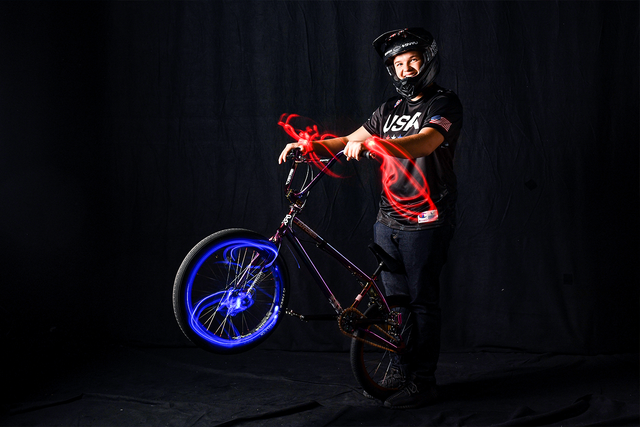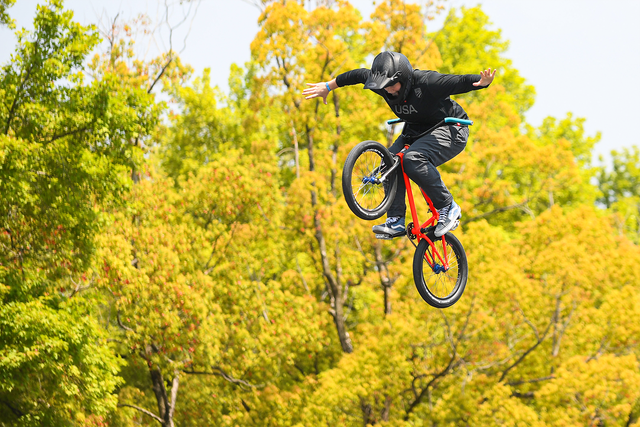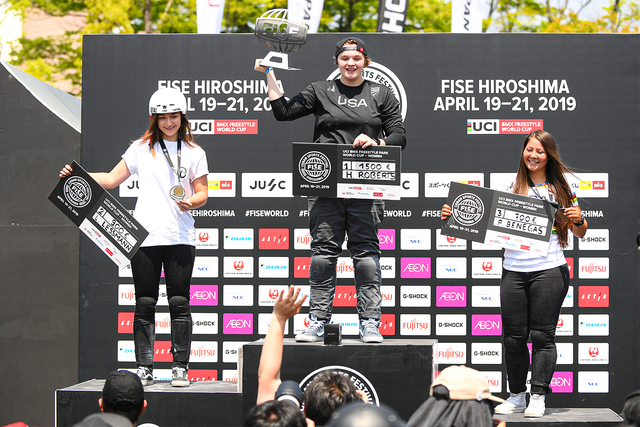
Hannah Roberts talks BMX freestyle, the Tokyo Games and her Olympic debut
It'll be worth the wait.
Before the 2020 Tokyo Games were postponed, 19-year-old Hannah Roberts was the first American to qualify for BMX freestyle’s Olympic debut.
BMX freestyle involves athletes taking 60-second runs on park courses, executing style and tricks on ramps and obstacles. They are judged on categories such as flow, execution, difficulty and originality.
BMX freestyle joins BMX racing, which made its Olympic debut at the 2008 Beijing Games.
One year later than planned, Roberts has the chance to become the youngest U.S. Olympic cycling medalist since 1912 and the first teenage woman from any country to win an Olympic cycling medal.
Editor's Note: This interview has been edited for length.
This interview was conducted by FOX Sports' Chloe Chrysikopoulos.
FOX: BMX freestyle will be an Olympic event for the first time in Tokyo. What was your reaction when you heard the news?
Roberts: I've always enjoyed watching sports. I used to play a lot of soccer, so my goal was always to be an Olympic athlete – no matter what I did. When I fell in love with BMX, when I started doing BMX more, my Olympic dreams went away for a bit, just because we didn't have the opportunity, which was OK with me.
But when it first got announced, it was June of 2017, so I was 15 years old, and it was awesome. I knew right from the get-go that it was going to be good for the sport – [it would] be able to push a new, younger generation and get more people to notice it. It wasn't on my radar really until later in that year, when I won the first World Championship. That's when I really thought that I could be going to the Olympics for BMX.
FOX: What does it mean to you to compete and represent your country in the Olympics and to be the first woman to do so in this event?
HR: It's really an indescribable feeling. Every time you put on the jersey, you have some feeling of honor. It's nothing that I take lightly. I don't usually wear the jersey unless I absolutely have to because I worked so hard for it. To be able to not only represent my sport but also my country is a whole other level of amazingness that I didn't think I would be able to achieve, especially this early in my life.

FOX: What would it mean to you to win a gold medal?
HR: Winning a gold medal for USA would be amazing. Obviously, [it's] everything that I've been working for, especially for this last year because it's been my main goal. For me, I just want to go and have a good time. And I know that if I have a good time and I'm in my right headspace, I can put down a run and do pretty well. I'm excited to see what all the other girls bring, but if I'm able to bring home that gold medal, that would be awesome.
FOX: What was the Olympic qualifying process?
HR: I think the qualifying process was from November of 2018 to – it was supposed to be May of 2020 – but obviously with COVID, that got shut down. I had a pretty hard year in 2018, so the last contest that counted for points wasn't very good for me, and I knew I needed to change things up, both physically and mentally.
Going into 2019, that was my whole goal: to work out and to work on ways to cope with some mental health stuff that I was dealing with. Overall, I just wanted to have fun with the sport and just love it, and luckily I had a phenomenal 2019 season and won just about every event that I went to. It was a good year for me, so qualification was just the World Cups and the World Championships.

FOX: What was 2020 like for you? How did you stay motivated through the pandemic, especially after you qualified?
HR: Being already qualified was a blessing and a curse. We made it super strict for the riders because there were about eight of us who lived near Raleigh, North Carolina, and we were all riding in the same place. We couldn't go to the store. Everything that we needed grocery-wise had to be delivered to our house. We couldn't see anyone outside of our bubble, so no going out and seeing other friends. The first part I was fine. I was still riding with my friends, having a great time. And then I started putting more pressure on myself because I felt like I had something to prove since my spot was already solidified and we had to wait another year, which kind of put me in a weird position where riding wasn't as fun ... because I was weighing myself down with all the pressure.
But I took a few weeks off, and even though 2020 wasn't a big year for BMX and contests — obviously, because we didn't have any — it was a really big year for me personally. I bought a house with my wife. We got engaged and married. I made some really big leaps with everything on the backside of my life that I never got to focus on because of travel, so that was exciting.
FOX: What is your mindset getting back into competition?
HR: I just want to do the absolute best that I can. I know my limits, and I always want to push them a little bit, but at contests, I have to be a bit more conservative and make sure the stuff that I do is dialed in and that I don't take a chance at slipping up because I don't want to cost me the contest. I'm a bit nervous that our first big world event that is back is the World Championship, just because I won it in 2019. It's exciting, but it's also a little bit nerve-wracking because I'll be fighting for that rainbow jersey again.
But I'm just excited to see what everybody else is doing, and I know there are a few riders I'm riding with that are just going to go and kill it. They are going to definitely hold their own, and I have to go hold my own. I'm excited but a little nervous going into this contest season.

FOX: Are you working on new tricks for the Olympics? Do you have an established routine?
HR: For learning tricks and going into a training session, you have a set group of tricks that you want to work on, that you want to get better. Then you have other stuff that you already have down and you just do to fill in the blanks. For learning tricks, if I can think about it in my head and think about the motions that it takes to do that certain trick, I'll try it, especially when we have the foam pit — because why not? That's how I go about it.
But for a contest run, I don't really plan anything until I get to the course and I'm able to ride it at least once because everywhere you go, the ramps are built a little bit different. So once I go and ride, that's when I really plan out my run, but as far as a certain routine, I never really go into a contest or a normal session with everything that I need to do, and that's all I do. I always try to push myself and the limits just a little bit.
FOX: When did you start BMX riding, and what drew you to it?
HR: I was about 8 years old when I started riding, and I had done all the team sports. I played football, soccer when I was younger and even going through middle school, but I didn't really like the aspect of relying on a team. I wanted to be able to see how I ranked up, and it was hard to do that within a team.
I was watching TV one day with my dad, and we were watching an X Games or a Dew Tour, which were huge back in the day in the early 2000s. And I just fell in love with it. I told him I wanted to try it, so he got me my first bike and took me to the skate park, and that was it. It was something I saw, and [it] immediately drew my attention.

FOX: How do you train to be a BMX rider? What is your diet, workout and recovery regimen?
HR: My whole routine just changed because we are closer to the Olympics, and I have high expectations for myself. But I lightened it up within the last few weeks because I didn't want to stay on a strict training schedule and burn myself out completely. I ride five to six days a week for about three hours or so. Then four days a week, I go to the gym, and I eat four times a day, pretty small portions with lots of protein. And I just really try to focus on staying happy. Times I'm not on my bike, I just try to step away from the stress and be in my happy place. That's an average day.
FOX: Have you dealt with any major injuries since you started riding?
HR: I've had my share of concussions and broken bones, but that just comes with the sport. Anything that you do, you never know what's going to happen. Unfortunately for action sports, if you're feeling a little bit off, it could really cost you injury-wise. There is a certain risk that you're willing to take every time you step on the bike, and it's not because you're not scared. It's because you love what you do, and you're willing to give it your all. I've seen brain injuries and broken backs in the sport, and it's scary to think about, but you just have to push through, and if you truly love the sport, you're able to work through that and get past the fear.
But you do have to take it seriously at all times because one split-second of a mistake could end up costing you either months or years of your life because you didn't pay attention. With that being said, I've had quite a few injuries. I broke my back when I was 10. My worst concussion was in 2019 — I completely knocked myself out. I've had my share of hospital visits, but in the end, it's all worth it because I love what I do, and I wouldn't take it back for anything.

FOX: What disparities do you see between men’s and women’s BMX riding?
HR: Men's BMX has been supported since probably the 70's. That was the time that BMX really got started. There are a lot more guys on the scene, and their level is a little bit higher at the moment, just because they've been around for longer, and women's contests didn't really take off until the first FISE event with a women's contest throughout the whole series in 2016. There were a few other women's events around the world, but it was one or two a year, so there's a bit of difference in how many women are competing.
[As for] the skill level, usually a lot of women start a little bit later, and it's harder to progress quickly because you have to work in the fear. Also, not a lot of people knew that women rode bikes for a while. I think 2018 was probably the first year that the big World Cup events were televised consistently. It took a while for people to see that there were women riding bikes, and we are serious about it, love it, and it's not just to get attention.
There weren't that many people who knew, so we didn't get paid as much and still don't get paid as much, but it's going up. I think our class' skill level is rising faster than the guys because we do have a little bit of leeway. It's something that I've been in since I was 12 years old. That's when I rode my first pro class. That's when I really got to see the inconsistencies between the men's and women's side of the sport. For me, it's not new, and it's not exhausting. We've been doing a lot better with getting paid regularly, and a lot more women are able to pick up big sponsors like Vans. I got Hyper bikes, which inspires younger girls to want to ride, so that's only going to push it forward.

FOX: What advice would you give other women and girls who want to break into the sport?
HR: Don't be afraid to push your own boundaries because you're going to fall. You might get hurt. But as long as you can get back up and you still are as infatuated and love the sport as much as you did when you first tried it, there's nothing that you can't do. As long as you can see it, you can do it. That was the biggest advice that helped me.